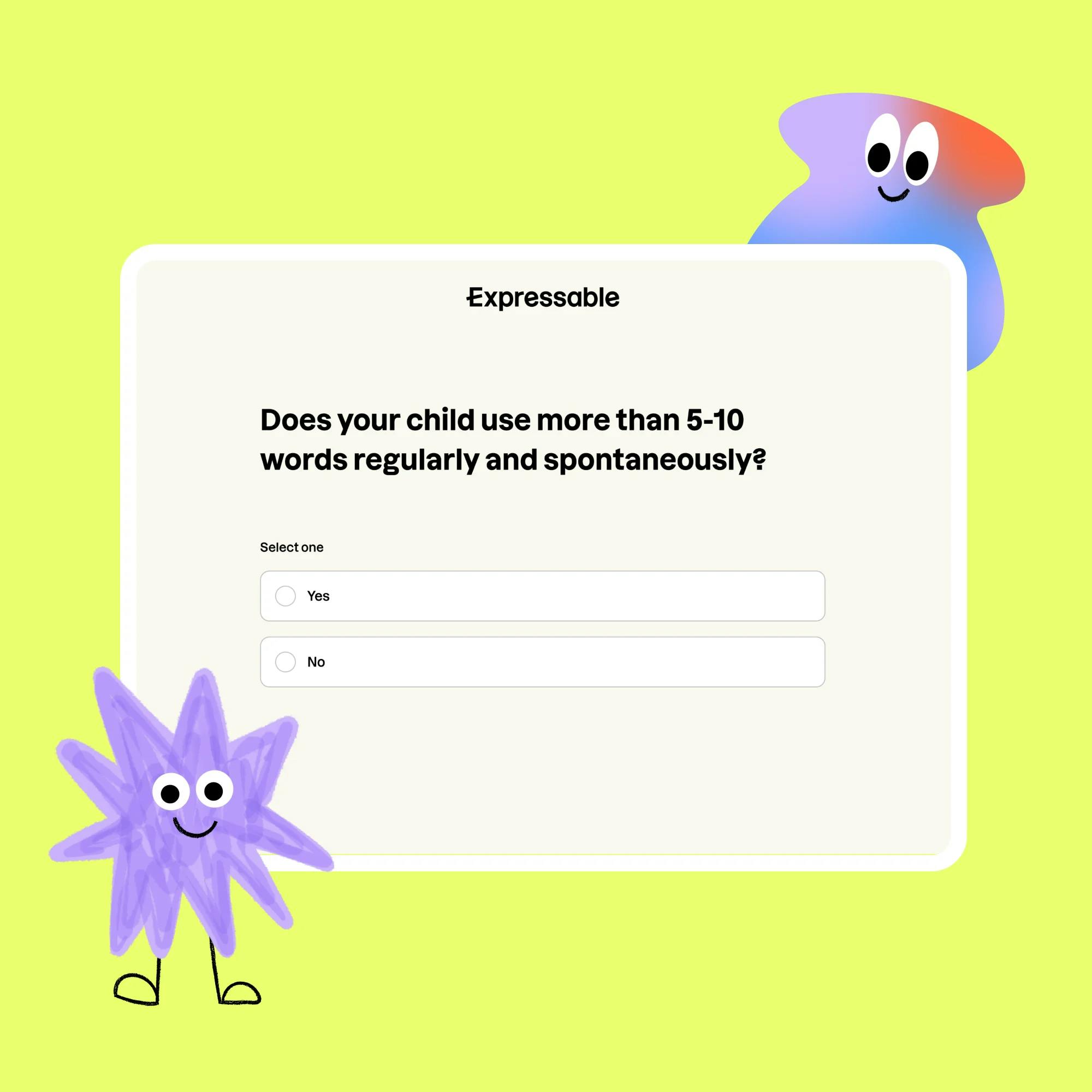This article was last updated on October 28, 2024. We’ve added a new FAQ section and other links to provide more information and answer common questions related to ADHD and speech delays. Our goal is to keep our content fresh and relevant, so you have access to the most up-to-date information.
Toddlers naturally have lots of energy, whether they're running away from you in the grocery store, interrupting conversations, or jumping off the furniture. This common toddler behavior is one reason attention-deficit/hyperactivity disorder (ADHD) is rarely diagnosed before a child is 4 years old.
But what if your toddler has a speech delay? Could it be caused by ADHD? Well, research shows that a speech delay could be one of the earliest signs for children who receive an ADHD diagnosis later on—so there's certainly some evidence that the two are linked.
In this article, we discuss how ADHD affects speech development, how to recognize the signs of an ADHD-related speech delay, and how speech therapy can help your child thrive.
Could your child have a speech delay?
Take our screenerWhat is ADHD?
ADHD is a neurodevelopmental condition that affects 11% of children ages 4 to 17. If ADHD's impact on a child is not addressed and supported, it may affect their ability to succeed at school, build relationships, and develop confidence.
The main symptoms of ADHD include:
Difficulty focusing on a specific task
Forgetfulness or problems with memory
Acting without thinking
Impatience or trouble waiting their turn
Struggling with impulse control
High amount of energy or activity
Interrupting or speaking at inappropriate times
Trouble following instructions
Fidgeting or squirming in their seat
Many of these symptoms can be found in your average toddler—have you ever met a 2-year-old who didn't have a short attention span? However, the key difference is that toddlers who don't have ADHD (or another disorder) tend to grow out of these behaviors.
It’s important to note that ADHD also comes with strengths. People with ADHD report that these qualities can be benefits, whether at school, at work, or socially:
Hyperfocus
Resilience
Creativity
High energy
Spontaneity and adventurousness
Strong conversational skills


The link between ADHD and speech development
ADHD is most commonly diagnosed around the age of 6 or 7. By this age, children are typically able to pay attention for longer periods and focus on tasks when needed.
However, recent research shows that if your toddler has a speech delay, it could be an early warning sign for ADHD. For example, this 2016 study found that children with poor language skills at age 3 were more likely to have inattention and hyperactivity symptoms at 5 and a half years old. This is just one of many studies linking ADHD with speech and language development issues in children.
Many children with ADHD lack the core skills needed to learn language. They struggle to process information and maintain focus.
When you consider how children learn to speak—through memorizing new words, mimicking their caregivers, and listening to the sounds around them—it's easy to see how ADHD can affect speech development.
Many children with ADHD lack the core skills needed to learn language. They struggle to pay attention, process information, and maintain focus. As a result, they can quickly fall behind their peers and miss crucial language development milestones.
Find the right speech therapist for your child
We'll match you with a licensed speech therapist who's experienced in your child's needs and available when you are.
 Get started
Get startedCan ADHD cause a speech delay?
While it's not 100% clear if ADHD can cause your child to have a speech delay, we know that many children with ADHD also have speech development issues. However, more research needs to be done to understand why these conditions are so closely connected.
As mentioned above, one theory is that since ADHD affects a child's ability to organize their thoughts, stay focused, and memorize new information, they may learn to speak more slowly or mispronounce words. Children with ADHD also have difficulty following instructions or understanding what’s said to them, which can make it harder for them to learn new words.
As a result, kids with ADHD may be misunderstood, become frustrated, and talk less. This can lead a toddler to engage in fewer conversations with caregivers and peers—and if a child doesn't practice their language skills in this way, it could cause a speech delay.


How to recognize an ADHD-related speech delay in toddlers
It might be hard to tell if your toddler has ADHD or they're just extra energetic. However, the signs of a speech delay are a little easier to spot.
Specifically, studies show that children with ADHD are more likely to struggle with expressive language skills. That means your toddler might take longer to say their first words or have difficulty expressing themselves verbally, especially when compared to other kids their age.
Children with ADHD may also have receptive speech delays. For example, toddlers might not respond to simple directions like “come here” or “wave bye-bye.” If they answer questions inappropriately (like saying “yes” when the right answer would be “no”), this could also signal an ADHD-related receptive speech delay.


Finally, there’s quite a bit of research showing that children with ADHD might have pragmatic language issues. Pragmatic language skills (also known as social communication skills) refer to a child’s ability to follow the “rules of a conversation.”
For example, a child with ADHD might often interrupt their conversation partner or give answers before a question is finished. For toddlers, pragmatic language issues might include misunderstanding verbal cues or avoiding eye contact.
Supporting your child with ADHD and a speech delay
If you suspect that your toddler has a speech delay due to ADHD, speech therapy can help. The first step is to schedule a speech evaluation with a qualified speech-language pathologist (also known as a speech therapist).
During the evaluation, the speech therapist will ask questions about your child's language development. They’ll observe how your child communicates with others and assess their knowledge of vocabulary or receptive language concepts. If speech therapy is recommended, your speech therapist will create a personalized treatment plan to develop your child’s communication skills.
It's also important to tell your pediatrician about your child's ADHD symptoms. They may recommend ADHD testing, behavioral therapy, medication, or another type of treatment plan.


Get matched with a speech therapist
Ultimately, recognizing the link between ADHD and speech development could help you identify your child's symptoms sooner rather than later. With the right diagnosis and treatment, your child will have the tools they need to reach their full potential.
If you're ready to learn more about speech therapy for your toddler, Expressable can match you with a licensed speech-language pathologist who fits your needs. Get started by clicking here!
Frequently asked questions about ADHD and speech delay
1. What’s the link between ADHD and a child’s speech? Research has shown that a speech delay can be an early sign of ADHD. Children with ADHD often struggle with the skills needed to learn language, such as attention and focus. As a result, they can fall behind and miss crucial language milestones. If you’re not sure if your child is on track, take our free online screener to find out more.
2. What types of speech problems might occur in kids with ADHD? Children with ADHD are more likely to struggle with expressive and receptive language skills. They might take longer to say their first words, have difficulty sharing their thoughts, or have a tough time following directions. They also may have problems with social interactions.
3. How young can a child be diagnosed with ADHD? Toddlers have lots of energy, which is one reason ADHD is rarely diagnosed before a child is 4 years old. ADHD is most often diagnosed around the age of 6 or 7. However, if your toddler has a speech delay, it could be a sign of ADHD. Trust your gut and contact a speech therapist. The earlier speech therapy begins, the better the outcomes!
4. Can speech therapy help children with ADHD? Yes! Speech therapists can treat any communication problems that are related to ADHD. They can also help children who have attention or concentration issues, such as trouble staying organized or paying attention during daily tasks. Learn more about speech therapy for ADHD in this article.
How Expressable Can Help
Concerned your child isn't reaching age-expected milestones? Looking for communication support from a professional? Expressable is a national online speech therapy practice serving children and adults. We treat all major areas of communication and feeding, offer flexible hours including evenings and weekends, and accept most major health insurance plans. We’re proud to have earned more than 3,000 5-star reviews from our clients (4.9/5 average).
Our therapy model is centered on parent and caregiver involvement. Research proves that empowering caregivers to participate in their loved one’s therapy leads to better outcomes. That’s why we combine live, 1-on-1 speech therapy with personalized education and home practice activities for faster progress.
Communication is more than words. It’s how we share how we feel and show who we are. We’re here to help you or your child do just that.

 Leanne Sherred, M.S., CCC-SLP
Leanne Sherred, M.S., CCC-SLP










